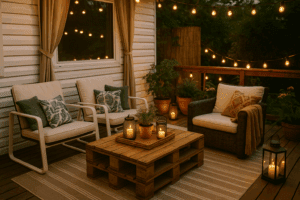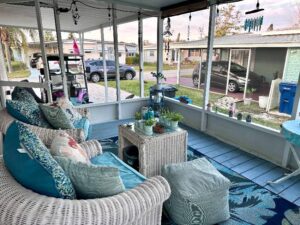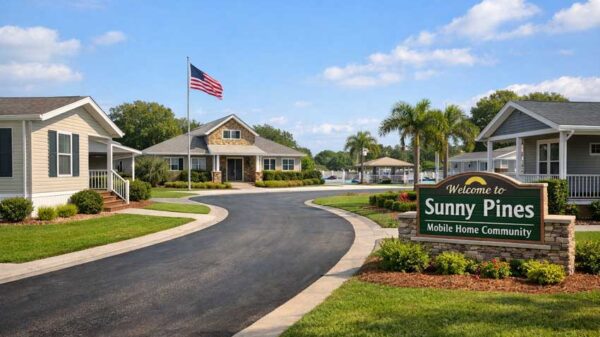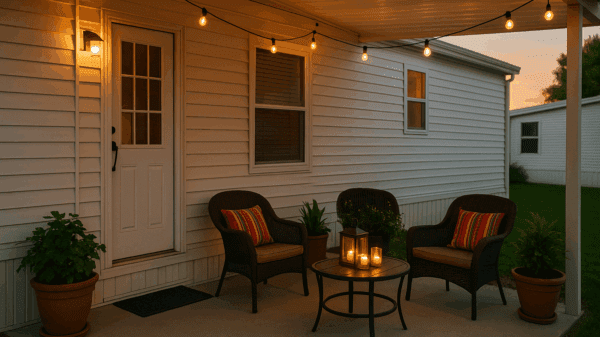Living in a mobile home has a lot of perks—affordability, flexibility, and a cozy atmosphere. But what about when you add furry friends into the mix? Whether you’re already a proud pet parent or thinking about adopting, living in a mobile home with pets is absolutely doable (and delightful!) with a few smart adjustments.
This comprehensive guide covers everything you need to know about mobile home living with pets—from space-saving tips and safety advice to community rules and pet-friendly upgrades.
Table of Contents
Why Pets and Mobile Homes Go Hand-in-Paw 🐾
If you think a mobile home might not be suitable for pet ownership, think again! In fact, many pet owners find that living in a mobile home with pets brings them even closer to their furry companions. The compact, efficient layout of a mobile home can create a cozy, manageable environment where pets feel right at home—and their humans can enjoy a lifestyle that’s both pet-friendly and cost-effective.
1. A Cozy and Manageable Living Space
One of the most appreciated features of a mobile home is its cozy layout. For pets, especially those that are smaller or prefer close quarters, this type of home creates a den-like atmosphere where they feel secure. Dogs and cats alike often prefer smaller, enclosed spaces where they can keep an eye on everything and stay close to their humans.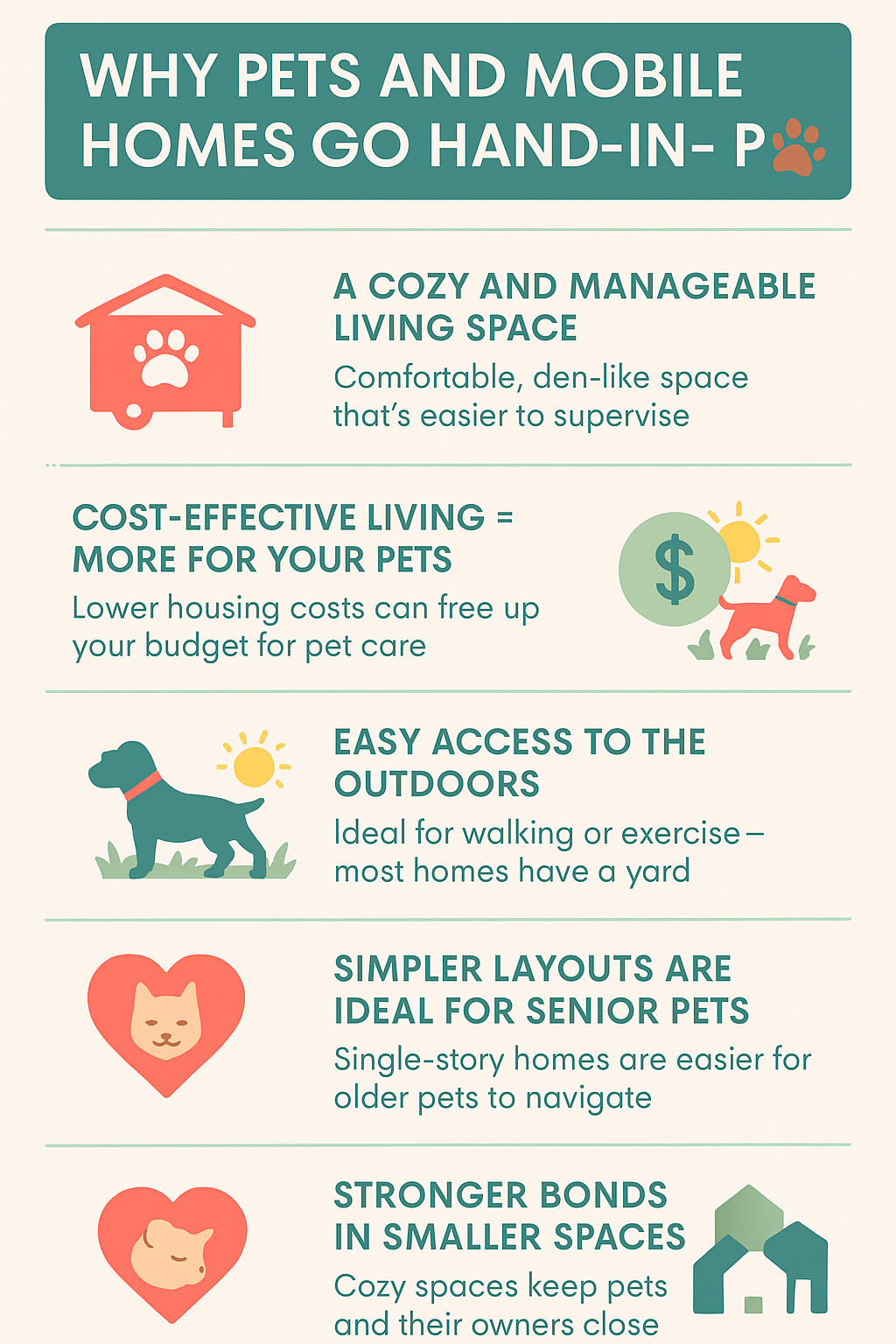
For pet parents, a smaller space is easier to manage when it comes to cleaning up pet hair, accidents, or spills. It’s also easier to keep an eye on your pets and make sure they’re safe, especially with young or senior animals that require more supervision.
2. Cost-Effective Living = More for Your Pets
Mobile homes tend to be more affordable than traditional stick-built houses, freeing up part of your budget for things that directly benefit your pets. Whether it’s a high-quality diet, regular vet visits, or fun accessories like toys, beds, and grooming gear, you’ll have more flexibility to spoil your four-legged family members.
Pet insurance, emergency funds, and training classes are also easier to afford when your cost of living is lower. That added financial wiggle room can significantly improve your pet’s quality of life.
3. Easy Access to the Outdoors
Many mobile homes are located in communities or on private lots where there’s more green space and easier access to the outdoors. Whether you’re in a park with walking trails or on a rural lot with a big backyard, your pet can enjoy more time outside—and you’ll enjoy fewer muddy paw prints indoors.
With just a few safety precautions (like fencing or leash setups), you can turn your mobile home lot into a fun and secure play zone for pets. For cat owners, outdoor catios or screened porches offer a safe way for felines to enjoy fresh air.
4. Simpler Layouts Are Ideal for Senior Pets
As pets age, mobility becomes a concern. Mobile homes are often single-story, which is a huge plus for senior dogs and cats who may struggle with stairs or slick floors. The compact layout also makes it easier for them to find their way around, even if vision or hearing starts to decline.
Many pet owners also choose mobile homes for retirement living, and having a pet in this environment can offer incredible companionship, reduce stress, and encourage daily routines like walking and play. Living in a mobile home with pets is possible with some planning.
5. Stronger Bonds in Smaller Spaces
One of the surprising benefits of living in a smaller home is that you tend to spend more time with your pets simply because you’re always close to each other. Whether you’re working from the kitchen table, relaxing in the living room, or catching a movie in bed, your pet is never far away. This closeness fosters deeper bonds and a sense of companionship that is hard to beat.
For solo dwellers or seniors, this companionship can be especially important, offering emotional support, routine, and even physical health benefits like lower blood pressure and reduced anxiety.
6. Great for Community Living (When Pets Are Allowed)
Many mobile home parks are pet-friendly and even cater to pet owners with on-site walking paths, pet stations, and social events. Living among other pet lovers can create a stronger sense of community and offer opportunities for dog playdates or shared pet-sitting duties.
Just be sure to check with your specific park about their pet policy—some have restrictions on breeds, sizes, or the number of pets allowed.
Choosing the Right Pets for a Mobile Home 🏡🐾
When it comes to living in a mobile home with pets, size—and personality—really does matter. Not all pets are created equal when it comes to adjusting to smaller spaces, and making the right choice can mean the difference between a harmonious household and one that feels crowded or stressful. The good news? There are plenty of pet options that are well-suited for mobile home living.
1. Small to Medium Dog Breeds
While many large dogs can adapt to smaller spaces if they get plenty of exercise, small and medium-sized dogs are often a more natural fit for mobile homes. Breeds like French Bulldogs, Cavalier King Charles Spaniels, Boston Terriers, Shih Tzus, and Dachshunds are known for being low-energy or adaptable, making them great companions in tighter quarters.

That said, don’t overlook a dog’s personality—some small breeds are surprisingly high-energy (we’re looking at you, Jack Russell Terriers!). The key is matching your lifestyle and available space with a breed’s exercise and social needs.
2. Cats: Independent, Compact, and Quiet
Cats are among the best pets for mobile homes. They require minimal space, can be litter-box trained, and typically spend a lot of time lounging. Indoor cats are especially ideal, as they’re less likely to get into neighborhood trouble or run afoul of community pet rules.
Adding a few vertical spaces like window perches, shelves, or a cat tree can enrich a cat’s environment without taking up floor space. Just be mindful of scratching behavior—some training or scratch-friendly furniture can go a long way.
3. Small Caged Pets
For those who want a pet but have extremely limited space, small caged animals like hamsters, guinea pigs, gerbils, or even ferrets can be a fantastic option. These pets require minimal square footage but still offer interaction, routine, and companionship.
Make sure you do your homework—some small animals, like ferrets or chinchillas, need more specialized care and space than others. Proper cage cleaning and ventilation are also key when living in a compact area to avoid odors or allergens building up.
4. Birds and Exotic Pets
Birds, such as budgies, cockatiels, or lovebirds, can thrive in mobile homes if provided with a proper cage, toys, and stimulation. Their singing and chatter can be a welcome sound, though it may not be ideal for everyone—especially in a community with close neighbors.
Some exotic pets, like reptiles or amphibians, are low maintenance and require little space. Turtles, geckos, and snakes (for those who enjoy them) can be ideal pets for smaller homes as long as their enclosures are well-maintained and temperature-controlled.
5. Fish: The Peaceful Option
Aquariums can add a peaceful and decorative element to any space. Small tanks with betta fish, goldfish, or small tropical species can be both calming and beautiful. Plus, they don’t take up much space and don’t create noise, smells, or pet hair.

Keep in mind that water changes and proper filtration are essential for fish health, and tanks over 10 gallons will need a secure, stable surface in your mobile home.
Things to Consider Before Choosing a Pet
Before bringing any pet into your mobile home, take time to reflect on these important factors:
-
Community Rules: If you live in a mobile home park, review their pet policies. Some communities restrict types or sizes of pets, limit the number of animals per home, or require additional deposits.
-
Allergies: If anyone in the home has allergies, consider hypoallergenic breeds or animals that produce less dander.
-
Noise Sensitivity: Some pets are louder than others. If you share walls or live close to neighbors, a yappy dog or a squawking bird might cause issues.
-
Available Time and Lifestyle: Pets require time, attention, and care. Choose one that fits your routine and energy level.
-
Temperature Control: Ensure that your mobile home is properly insulated and climate-controlled. Certain pets are sensitive to heat or cold and may need extra care.
Creating a Pet-Friendly Environment 🐕🐾🐈
Transforming your mobile home into a cozy haven for both you and your pets doesn’t require a major renovation—just some thoughtful planning, smart storage solutions, and attention to safety and comfort. Here’s how you can create a space that’s not just livable but lovable for your furry (or scaly, or feathery) family members.
1. Optimize Space for Movement and Rest
Mobile homes often have limited square footage, so it’s crucial to make the most of the space you do have. Start by creating clear walkways and open areas where pets can comfortably roam, play, and relax.
-
Pet Zones: Designate specific areas for feeding, sleeping, and playing. This not only helps with cleanliness but gives pets a sense of structure and security.
-
Multi-Use Furniture: Look for furniture that doubles as pet-friendly spaces—like ottomans that open for toy storage, or couches with hidden beds.
-
Elevated Spaces for Cats: If you have a cat, consider wall-mounted shelves, hammocks, or window perches that allow them to climb and observe their surroundings without taking up floor space.
2. Flooring Matters
Pets can be tough on floors. Claws, accidents, and spills are inevitable, so durable, easy-to-clean flooring is a must.
-
Best Options: Vinyl, laminate, and tile floors are scratch-resistant and easy to mop, making them perfect for pet owners.
-
Avoid Carpets: While cozy, carpet can trap pet hair, odors, and dander, and it’s more difficult to keep clean.
-
Add Area Rugs: If you want warmth underfoot, opt for washable rugs with rubber backing to prevent slipping—both for you and your pet!
3. Storage Solutions for Pet Gear
Toys, leashes, grooming tools, and food bags can clutter up a small space quickly. Smart storage is essential.
-
Wall Hooks & Bins: Install hooks for leashes and harnesses near the door, and use bins or baskets to hold toys and grooming supplies.
-
Under-Furniture Storage: Use the space under beds or couches to stash less-used items in sealed containers.
-
Feeding Station Drawers: Consider adding a pull-out drawer for food and water bowls to keep feeding areas tidy and out of the way.
4. Climate Control for Comfort
Mobile homes can be more susceptible to temperature swings. Pets are often more sensitive to heat and cold, so maintaining a consistent and safe environment is key.
-
Fans & Heaters: Ensure airflow in the summer and warmth in the winter. Small, quiet fans or pet-safe space heaters can help.
-
Cooling Mats or Heated Beds: These are great additions depending on the season and your pet’s breed.
-
Window Coverings: Use curtains or blinds to help regulate the temperature inside and create darker, cozy resting spots.
5. Pet-Safe Décor & Furniture
Make sure your home is as safe as it is stylish. Curious pets can get into trouble quickly if hazardous items are left within reach.
-
Skip Toxic Plants: Many common houseplants (like lilies, aloe, or pothos) are toxic to pets. Opt for pet-safe greenery like spider plants or Boston ferns.
-
Protect Upholstery: Use furniture covers or pet throws that are washable and durable to protect your seating areas from fur and accidents.

-
Avoid Fragile Décor: Keep breakable items off low shelves or tables where pets might knock them over.
6. Easy Access to the Outdoors
Whether you have a backyard, a deck, or just a front stoop, make it easy for your pet to get some fresh air safely.
-
Pet Doors: If feasible, install a pet door that leads to a secure fenced area.
-
Portable Play Pens: These are great for giving dogs some outdoor time in a small yard or park.
-
Leash Hooks & Mud Mats: Keep leashes handy by the door and use mats or towels for muddy paws to protect your floors.
7. Minimize Pet Stress in Small Spaces
In a smaller home, it’s even more important to ensure pets have places to retreat and recharge.
-
Create a Quiet Corner: Set up a bed or crate in a quieter part of the home, especially for pets who need alone time.
-
Use White Noise: If your pet is sensitive to outside noises (common in mobile home parks), a small white noise machine can help them feel calmer.
-
Keep a Routine: Pets thrive on routine. Regular walks, feeding times, and play sessions can reduce anxiety and improve behavior.
8. Safety First!
A few extra precautions go a long way in a mobile home:
-
Secure Trash Cans: Pets can easily tip over trash cans—consider models with locking lids.
-
Hide Electrical Cords: Chewing cords is dangerous. Use cord protectors or hide them behind furniture.

-
Proper Ventilation: Especially important if you use litter boxes, aquariums, or cages—good airflow keeps the air fresh and reduces allergens.
By staying proactive and pet-aware, you can ensure your mobile home is not just a shelter, but a sanctuary. Living in a mobile home with pets can be a rewarding experience for you and you pet. A few thoughtful precautions go a long way toward keeping your best friend healthy, happy, and safe—no matter how compact your living space may be.



